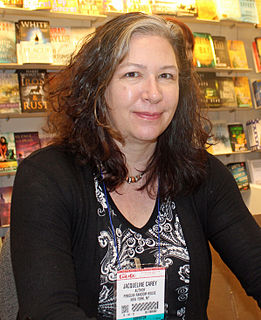A Quote by Jacqueline Carey
It is a fine line, in all of us, between civilization and savagery. To any who think they would never cross it, I can only say, if you have never known what it is to be utterly betrayed and abandoned, you cannot know how close it is.
Related Quotes
We all like to think that the line between good and evil is impermeable--that people who do terrible things, such as commit murder, treason, or kidnapping, are on the evil side of this line, and the rest of us could never cross it. But the Stanford Prison Experiment and the Milgram studies revealed the permeability of that line. Some people are on the good side only because situations have never coerced or seduced them to cross over.
I gaze lovingly at "Hilal" a love that is reflected through time or what we imagine to be time, as in a mirror. She was never mine and never will be; that is how it is. We are both creators and creatures, but we are also puppets in God's hands, and there is a line we cannot cross, a line that was drawn for reasons we cannot know. We can approach and even dabble our toes in the river but we are forbidden to plunge in and let ourselves be carried along by the current.
When adults say, "Teenagers think they are invincible" with that sly, stupid smile on their faces, they don't know how right they are. We need never be hopeless, because we can never be irreparably broken. We think that we are invincible because we are. We cannot be born, and we cannot die. Like all energy, we can only change shapes and sizes and manifestations. They forget that when they get old. They get scared of losing and failing. But that part of us greater than the sum of our parts cannot begin and cannot end, and so it cannot fail.
I have to ask myself how I can possibly expect to know Jesus as he would want to be known if my life remains unscathed by trouble and grief. How can I hope to grasp anything of God's heart for this broken planet if I never weep because its brokenness touches me and breaks my heart? How can I reflect his image if I never share in his sufferings? And how will any of us ever learn to treasure his hesed and grace if we never experience phases where these blessings seem absent?
When you are young, you think it's going to be solved by love. But it never is. Being close -- as close as you can get -- to another person only makes clear that impassable distance between you.' If being in love only made people more lonely, why would everyone want it so much?' Because of the illusion. You fall in love, it's intoxicating, and for a little while you feel like you've actually become one with the other person. Merged souls and so on. You think you'll never be lonely again.
You
cannot assume that somebody can define you. You cannot
assume that the other person is right. No matter how they
say it to you, no matter with how much force they say, ‘Oh
my god, you’ll never make it; oh my god, you’re not bright;
you could never do this’—that’s one person. I can’t tell you
how many people told me I would never be an actor.
When [Jean-Paul] Sartre was asked whether or not he would live under a communist regime he said, "No, for others it's fine, but for me, no." He said it! So it's hard to say just how intellectual his stance is. How can you think that never in your life would you go to live in a communist regime and still say it's fine for everybody? A very difficult thing, that, but Sartre managed it.
I could think of nothing else to say to her. In fact I could never think of anything to say to her, and I sat thinking of past painful conversations between us: How are you, Jean Louise? Fine, thank you ma'am, how are you? Very well, thank you; what have you been doing with yourself? Nothin'. Don't you do anything? Nome. Certainly you have friends? Yessum. Well what do you all do? Nothin'.


































